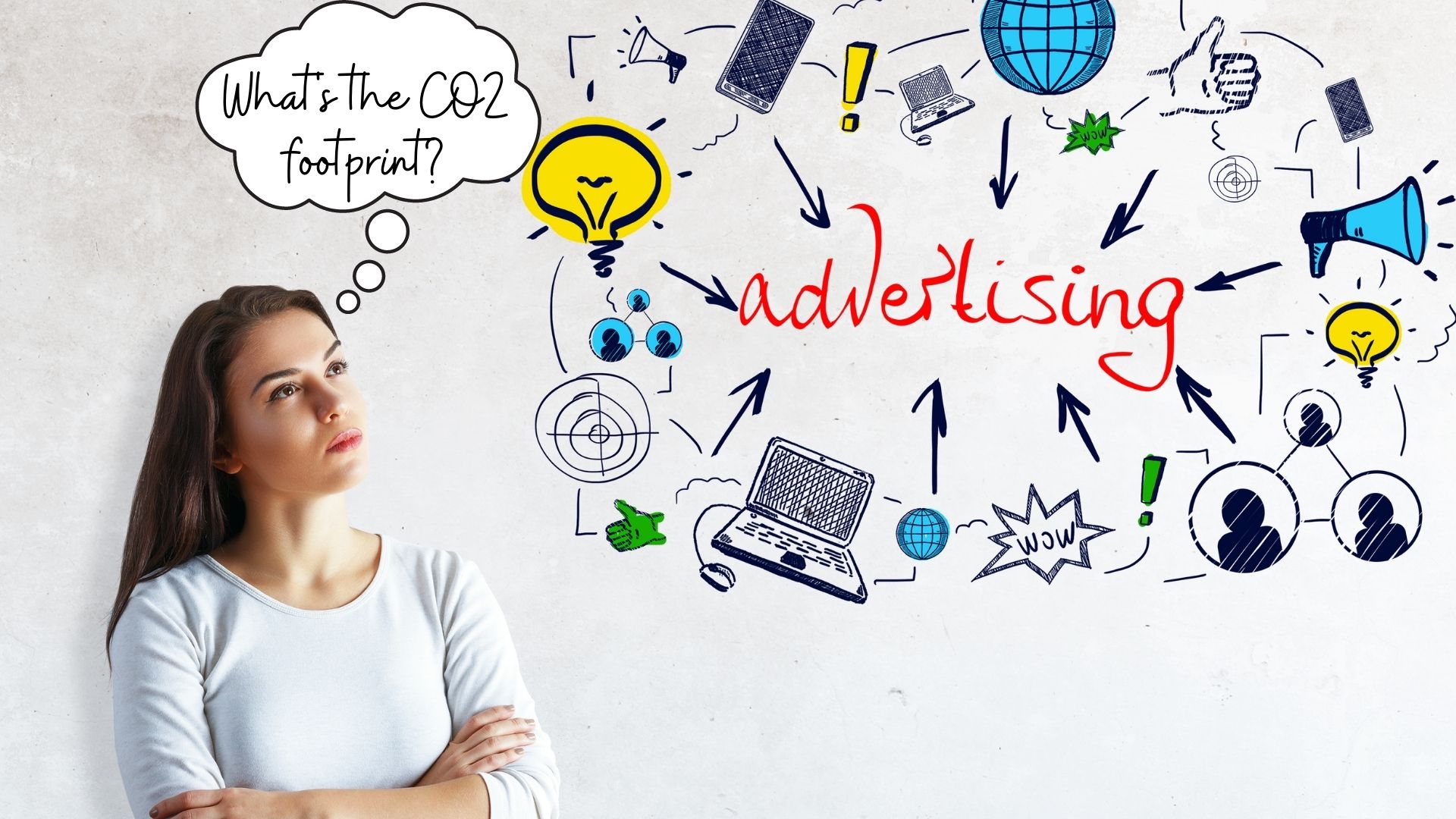Media advertising agencies are responding to the urgency of the climate crisis… but is it enough?
When a company decides to promote a new product through advertising – anything from a new shampoo, to a car, a pizza, or life insurance product, how much damage is being done to the environment by that advertising campaign?
That’s a question that’s been on the minds of some people in the advertising industry and so they’ve developed a tool that can now begin to answer this question. It’s called the Media Carbon Calculator and it’s part of the advertising industry’s recognition that the climate crisis needs urgent and collective attention.
ADVERTISING AND THE CLIMATE CRISIS
Last month (June 2021), the UK’s Institute of Practitioners in Advertising (IPA) launched the media carbon calculator, an online tool that media agencies can use to assess the carbon emissions of delivering a media campaign for a client. The media carbon calculator is a core element of the new IPA Media Climate Charter, which states that if we are to limit global warming to 1.5 °C. “we need rapid, far-reaching and unprecedented changes in all aspects of society.”
It’s a ground-breaking milestone. The Media Climate Charter is seen as the media agency industry’s first step to a zero carbon future. It aims to provide a roadmap for achieving the goals of the Ad Net Zero initiative, which was released in November 2020 and was born out of the advertising sector’s realisation it needed to join the call for urgent and big action on the climate crisis.
Why is this crucial? Because advertising is a big industry. In 2019, media advertising spend in the UK was £23.6 billion according to the Advertising Association and WARC. Wouldn’t it be great to see that money spent on restoring rather than emitting?
IPA President Julian Douglas says: “The science is clear. We need to turn fast and hard if we are to limit global warming to 1.5 degrees and mitigate the worst effects of global warming. Incrementalism is the enemy here too. This requires every single one of us to respond and transition. But we can’t succeed acting alone – we need fully committed industry-wide coalitions that drive the change we need to see.”
The media carbon calculator tool, which is available to charter members at https://ipamediaclimatecharter.co.uk/ is the advertising industry’s first attempt to quantify the impact of its work on clients’ campaigns. Once a benchmark is set, it will be possible to track, measure and reduce this impact.
The tool calculates the carbon emissions associated with a media plan based on the media mix, and uses a range of data sources, including DEFRA electricity emissions factors, device power outputs and energy intensity, to determine the carbon footprint of a media plan at channel level.
An algorithm is applied to compute the carbon footprint of a live campaign. These factors take into account an average of emissions in each channel. Variables considered include desktop versus mobile consumption, file sizes, view time, screen type, power consumptions and run cycles.
The tool does not, though, include transmission, ie, the data centres, servers, infrastructure, etc. used to deliver the message to the device. That’s a wicked problem for another day.
DRIVING CONSUMERISM
It is encouraging to see this kind of initiative from media agencies and the advertising industry. The uncomfortable question, though, is whether it’s enough to reverse the damage done by excessive consumerism in the last century?
Truth is, the carbon footprint of an ad campaign is just one branch on the tree of social and environmental destruction that has grown out of the work of the global advertising industry.
Can we ever quantify the scale of the damage done through the relentless promotion and normalisation of unconstrained consumerism? Messages like ‘you’re worth it’, ‘treat yourself’, ‘you deserve it’, ‘you’ll be more popular/ confident / beautiful with this’, ‘everyone’s doing it so why shouldn’t you…’… told to us over and over again to sell us everything from skin creams, to chocolate bars, overseas holidays, and more. To make us believe we need these things and cleverly triggering us to desire and yearn for these things. With scant thought to the damage done by the mass production and then disposal of these products, as well as their polluting by-products such as packaging and greenhouse gases.
We are all of us, though, complicit when it comes to the rampant excesses of consumerism. There is nothing to gain from pointing the finger of accusation at any particular company or industry (no matter how tempting). Blame-shifting is a waste of time that we do not have. We have all used fossil fuel vehicles, we’ve all bought plastic for its convenience, we’ve all bought a chocolate bar or cheap t-shirt even though both these industries are rife with modern slavery and habitat destruction.
What we desperately need is a new economic model. One that is based on people-planet-profit, as opposed to just the current ‘profit at all costs and regardless of harm’. We need a new relationship with, and model of, consumption. What if it were possible to work it so that every time we purchased something, it restored rather than degraded our ecosystems?
NAVIGATING A U-TURN
This is the fundamental challenge and one in which media agencies could play a valuable role. What industry is better at sparking our imaginations if not advertising?
How then, can the media advertising agency harness its enormous power and influence to help shift the world onto a sustainable path? How can we, society, (the people formerly known as ‘consumers’) be cleverly triggered by advertising into embracing sustainable lifestyles? Into restoring the natural world? Into choosing products, services and experiences that restore the planet and all life on Earth?
These are pressing questions for the advertising industry and, given the launch of the Media Climate Charter, there is at last some hope of these questions being pondered and answered as our best minds in the sector turn their attention to addressing the climate emergency.
So, thank you to all the agencies who have joined the IPA Media Climate Charter (as of July 2021), namely:
IPA Media Climate Action Group and creators of the Charter:
-
Mindshare – Rob McFaul
-
the7stars – Anuschka Clarke
-
Mediacom – Helen Brain and Pauline Robson
-
PHD – Frith Hofmeester
-
Rapport – Jack Monaghan
-
MGOMD – Tim Pritchard
-
Havas – Tony Mattson
The IPA Media Climate Charter members:
-
All Response Media
-
Carat
-
Essence
-
Goodstuff
-
Havas Media
-
Hearts + Science
-
Initiative UK
-
iProspect
-
MediaCom
-
MindShare Media UK Ltd
-
MGOMD
-
OMD
-
PHD Media
-
Spark Foundry
-
Starcom
-
the7Stars
-
The Kite Factory
-
UM
-
VCCP Media
-
Wavemaker
-
Zenith






